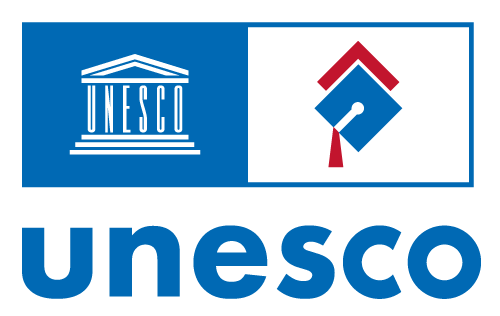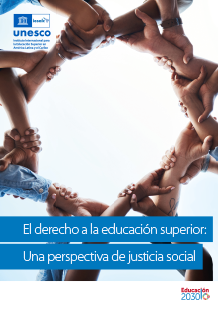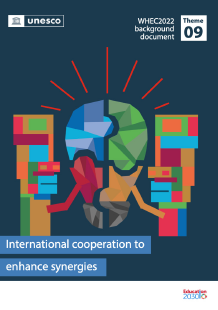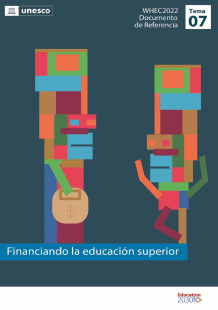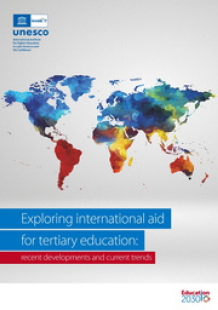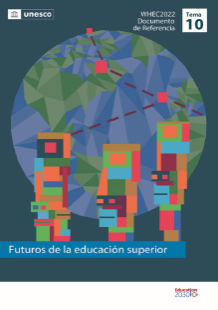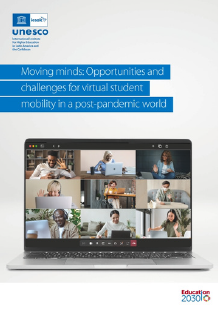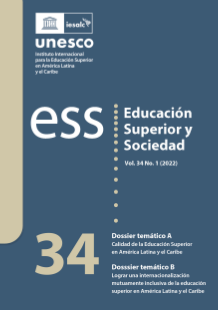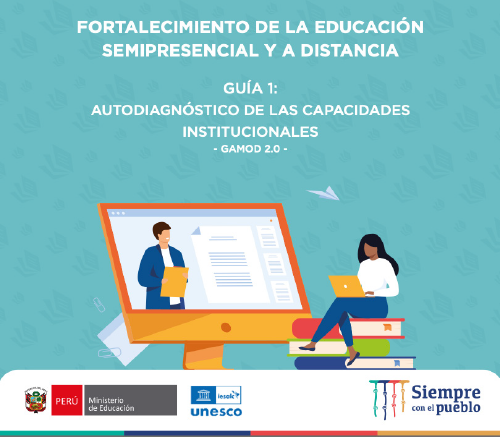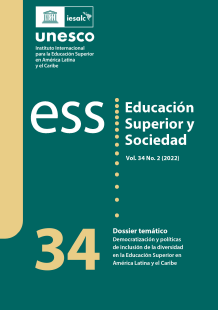2022 Annual Report
UNESCO IESALC
2022 Annual Report
2022 was marked by two important higher education events worldwide. First, the progressive return to classrooms, in parallel with the recovery efforts engaged by all Member States, and, second, the Third World Higher Education Conference (WHEC), which served the purpose of generating a refreshing view of the challenges faced by governments, institutions, and their supporting networks in the process of transforming higher education.
IESALC activities in 2022 were organized around five priorities: The World Higher Education Conference, academic mobility, quality, equity, and innovation.
Priority 1. The World Higher Education Conference
Priority 2. Academic mobility and international cooperation
Priority 3. Raising the bar for quality
Priority 4. Striving for the right to higher education
Priority 5. Fostering innovation
Priority 1
The World Higher Education Conference
Priority 1
The World Higher Education Conference
Supporting women’s participation in higher education in Eastern Africa: building sustainable and equitable higher education systems in Kenya, Uganda, and South Sudan. Worldwide, women outnumber men’s enrollment in higher education but not in Africa. This report describes the situation of women’s participation in the Eastern Africa Region, identifies areas with persisting gender inequalities, and provides policy recommendations.
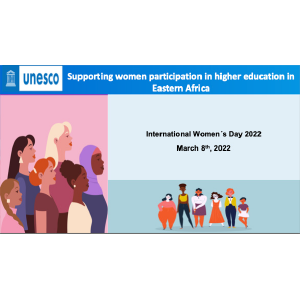
The Right to higher education: A social justice perspective. The right to higher education (RTHE) as part of the evolving landscape of the right to education has received less attention than education at other levels. This conceptual paper advocates for the RTHE by developing a framework that takes a social justice perspective on this issue, taking a systemic and structural approach to the issues facing students in higher education today.
International Cooperation to reinforce synergies. Many institutions, especially in the Global South, expect much more from international cooperation than access to more resources and greater prestige: they count on opportunities for capacity building, for raising their voice on the international HED agenda and global research priorities, and, above all, for promoting a humanistic approach to cross-cultural understanding and fertilization. In summary, we need a new paradigm in international cooperation that is fair, multidirectional, and an equal footing between countries and institutions, rather than unidirectional and centered on commercial and economic interests.
International Cooperation to reinforce synergies. Many institutions, especially in the Global South, expect much more from international cooperation than access to more resources and greater prestige: they count on opportunities for capacity building, for raising their voice on the international HED agenda and global research priorities, and, above all, for promoting a humanistic approach to cross-cultural understanding and fertilization. In summary, we need a new paradigm in international cooperation that is fair, multidirectional, and an equal footing between countries and institutions, rather than unidirectional and centered on commercial and economic interests.
International aid for higher education. International aid has the potential to become an engine for development and therefore could play a central role in advancing towards the 2030 SDG Agenda. Still, evidence of international aid outcomes shows mixed development results, and scholars engage in intense debates with valid arguments in favor and against the provision of international aid. The international community has organized multiple conferences and created a set of general standards that could lead to efficient international aid outcomes. However, specific evidence around international aid targeting tertiary education is very limited. IESALC conducted a major research effort to unveil recent trends and challenges on this topic.
Futures of Higher Education. This report, to which IESALC contributed, endorses an envisioning process of imagining the futures of higher education towards 2050. The common good was used as a visionary lens, and social justice was utilized as a framework to support accessible, inclusive, and equitable higher education systems that give every person a chance to develop to their full potential in a community. Findings from the futures studies’ literature and scientific and technical reports were used to imagine and draft four scenarios shared with higher education actors and policymakers for further creative inputs and development during consultations.
In addition, IESALC ran a major consultative process to bring the multiple voices in higher education in Latin America and the Caribbean. IESALC also supported the Higher Education team at UNESCO HQs throughout the preparation process in international cooperation, financing, and work on the futures of higher education. A very important outcome of the WHEC, the UNESCO Higher Education Roadmap (to be launched in 2023), also benefitted from the inputs of IESALC.
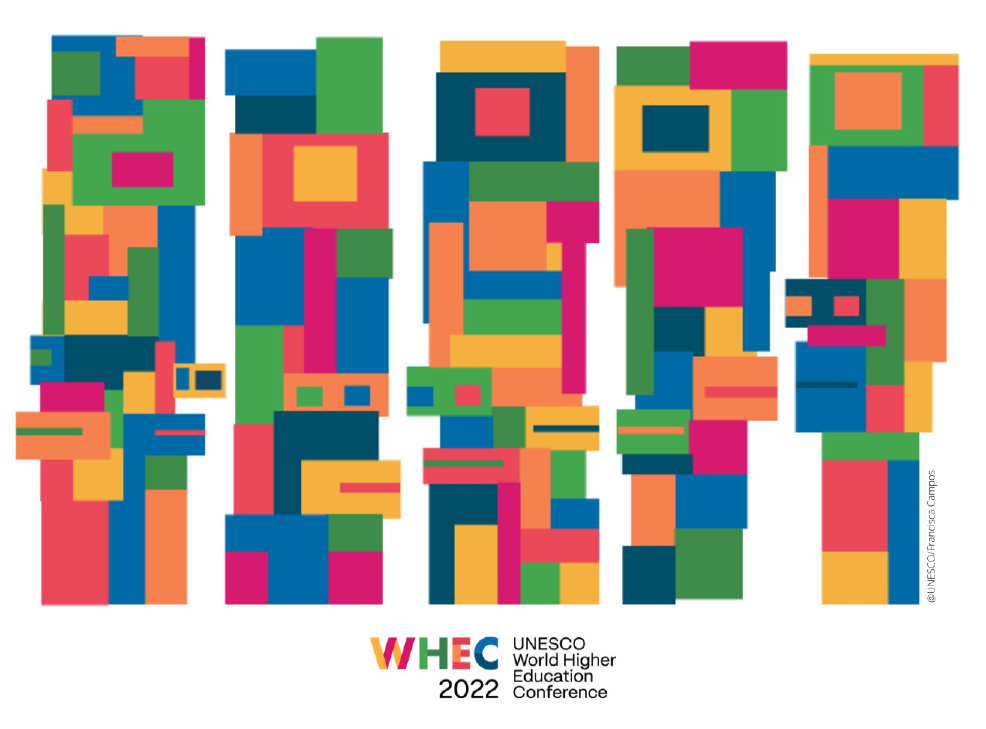
Priority 2
Academic mobility and international cooperation
Priority 2
Academic mobility and international cooperation
As a result of the Member States’ commitment to the Regional Convention, with the technical support of the Institute, the goal of crossing the threshold of having at least four ratifications for the Convention to enter into force was attained in October. As a result, Cuba, Grenada, Peru, Uruguay, and later the Holy See completed the ratification process in 2022, and accordingly, the corresponding Committee is set to start in 2023. In this process, the Institute has developed materials for awareness raising, capacity development, and an action plan for promoting both the Regional and the Global Convention. In addition, the Institute responded to the request of other Member States to support them in the ratification process, including Chile, Costa Rica, and Jamaica. More details about ongoing developments in the Regional Convention can be found in the dedicated space on the Institute’s website.

The prospects for virtual student mobility (VSM) as a result of COVID-19 are on the one hand being enhanced by increased attention to the opportunities it can provide as a replacement for physical mobility and as a response to challenges faced by the lack of environmental sustainability in physical travel. On the other hand, VSM may make some forms of higher education more exclusive at the very time when pre-existing inequalities are already being exacerbated. In line with UNESCO’s mission and an ethical interpretation of the internationalization process, this project investigated the relationship of VSM to access and quality in higher education in the context of COVID-19. The resulting report is available in English and Spanish under the title of“Moving minds: Opportunities and challenges for virtual student mobility in a post-pandemic world”.
The growing importance of academic mobility in Latin America and the Caribbean was also addressed by the Institute through an issue of its academic Journal of Higher Education and Society (ESS) dedicated to this topic.
Priority 3
Raising the bar for quality
Priority 3
Raising the bar for quality
IESALC contributed to regional discussions on public policies and levers that improve the quality and equity of higher education, the two sides of the provision of higher education. In 2022, the Institute focused its analytical and capacity development activities on three elements: recovery after COVID-19, the digital transformation of the provision of higher education, and the relevance of programmes to social and economic needs, putting special attention to the contribution of higher education to the SDGs. It also devoted a dedicated issue of its academic journal to the broad theme of quality of higher education in Latin America and the Caribbean.
As part of UNESCO IESALC’s ongoing response to Covid-19 and its effects on higher education, IESALC produced a major report on the impact of the pandemic under the title “Resuming or reforming? Tracking the global impact of the COVID-19 pandemic on higher education after two years of disruption”. The report provides a comprehensive picture of global higher educational responses to the COVID-19 pandemic in its first two years. The report offers relevant insights on the impact COVID-19 has had on higher education systems, highlighting global responses and how this experience can help us identify areas of improvement and strength.
UNESCO IESALC is actively supporting the digital transformation of higher education through research and capacity building projects, including a joint research initiative with UNESCO’s International Center for Innovation in Higher Education to investigate digital transformations in higher education teaching and learning. By focusing on Latin America, this joint research project will yield valuable insights into how digital transformations can be implemented in the region and identify the challenges that must be overcome. Ultimately, the project aims to unlock the potential of digital transformation in Latin American higher education, offering practical guidance and policy recommendations on how to implement these changes in ways that are equitable, sustainable, and student-centered and which strengthen the provision of quality higher education in the region.

For monitoring the digital transformation process, and at the request of the Ministry of Education of Peru, IESALC developed a self-evaluation tool that, for the first time, provided detailed information about the level of digital maturity of the 52 public universities in the country. The self-evaluation tool GAMOD online is a simple and user-friendly evaluation tool composed of a survey that collects 24 indicators structured in 3 dimensions: technological, organizational, and digital competence. GAMOD and the accompanying guides are available from the Ministry’s website.
UNESCO IESALC’s work on higher education and the UN Sustainable Development Goals (SDGs) aims to reinforce UNESCO’s commitment to progressing towards or achieving the SDGs. The main objective of this workstream is to provide evidence and good practices that can inspire HEIs across the globe to further promote the SDGs within their capabilities of education, research, engagement, and management. In addition, this project will reflect on the role of policymakers to support higher education contribution to the SDGs and provide policy recommendations. The emphasis on SDGs has been reflected in a two-part report on SDG 5, done in cooperation with The Times Higher Education, under the title of “Gender equality: how are universities performing?”.
IESALC’s work on SDGs, and more generally how higher education can contribute to sustainability, was also reflected on several courses and a Bootcamp on sustainability produced by the Institute in cooperation with the American University of Sharjah, the UK Open University and Anglia Ruskin University. The Bootcamp focused not only on supporting university teams in curriculum design for online and blended learning delivery but also on guiding and supporting the teams selected in the design and implementation of Education for Sustainable Development in their curricula supported by the CoDesignS ESD Toolkit. The Bootcamp involved 89 teaching teams from 20 Member States.


Priority 4
Striving for the right
to higher education
Priority 4
Striving for the right
to higher education
IESALC launched a major campaign to unfold the right to higher education concept from a social justice perspective. The Institute was instrumental in promoting the universal right to higher education, looking into the policy and financial implications. IESALC benefitted from a major grant from the Open Society Foundations that has allowed the Institute to enable a global conversation on this, starting at WHEC. This project aims at raising awareness on the right to higher education (RTHE) as a social justice imperative. To do so, the project will inform international discussions through evidence gathering and recommendations to generate a global consensus on the need to redouble efforts to support the enforcement of the right to higher education, as an integral part of the universal right to education. The project used the World Higher Education Conference 2022 occasion as a major opportunity for dissemination and advocacy. A first conceptual paper was published under the title of “The right to higher education: A social justice perspective”.
A dedicated issue of the academic journal of the Institute was published on the broad theme of the democratization of higher education in Latin America and the Caribbean and the much needed inclusion policies.
IESALC has also continued to promote gender equality in higher education, one of the most prominent UNESCO priorities, and the rising issue of gender-based violence in higher education. In 2022, UNESCO IESALC initiated a research project to respond to, and prevent, violence against women in the tertiary education sector. Through a partnership with UNESCO Headquarters, the project seeks to promote and establish strong guidelines at HEIs worldwide as a guiding principle for building nonviolent and more sustainable tertiary education systems.

UNESCO IESALC is actively supporting the digital transformation of higher education through research and capacity building projects, including a joint research initiative with UNESCO’s International Center for Innovation in Higher Education to investigate digital transformations in higher education teaching and learning. By focusing on Latin America, this joint research project will yield valuable insights into how digital transformations can be implemented in the region and identify the challenges that must be overcome. Ultimately, the project aims to unlock the potential of digital transformation in Latin American higher education, offering practical guidance and policy recommendations on how to implement these changes in ways that are equitable, sustainable, and student-centered and which strengthen the provision of quality higher education in the region.

Priority 5
Fostering innovation
Priority 5
Fostering innovation
IESALC put a lot of effort into promoting the pedagogical renewal of higher education through analytical work. However, after COVID-19, there is a risk of misunderstanding what innovation in higher education should stand for: not for the sake of technology, but rather to enhance the quality and equity of the student experience and internal efficiency.

Along this line, at the request of the most prominent Peruvian public university entirely devoted to teacher training, the Universidad Enrique Guzmán y Valle, IESALC designed a major activity to strengthen the capacities of its authorities and teachers in soft skills, agility and change management in line with the demands of the UNE Educational Project. During eight weeks and in 4 consecutive editions a total of 11 authorities (Rector and Academic and Research Vice Rectors), 52 department directors, and 280 teachers participate in different courses with the support of 10 mentors and experts in change management and agile methodologies. This training program involved peer-learning activities with universities from Chile, Colombia, Mexico, and Spain.
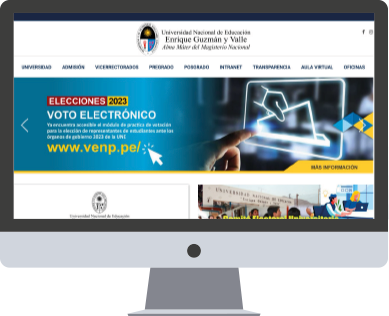

The Institute organized or actively participated in webinars, forums, and conferences at regional and international levels to promote its work. In 2022, the staff of IESALC participated in 132 dissemination activities in 37 countries.
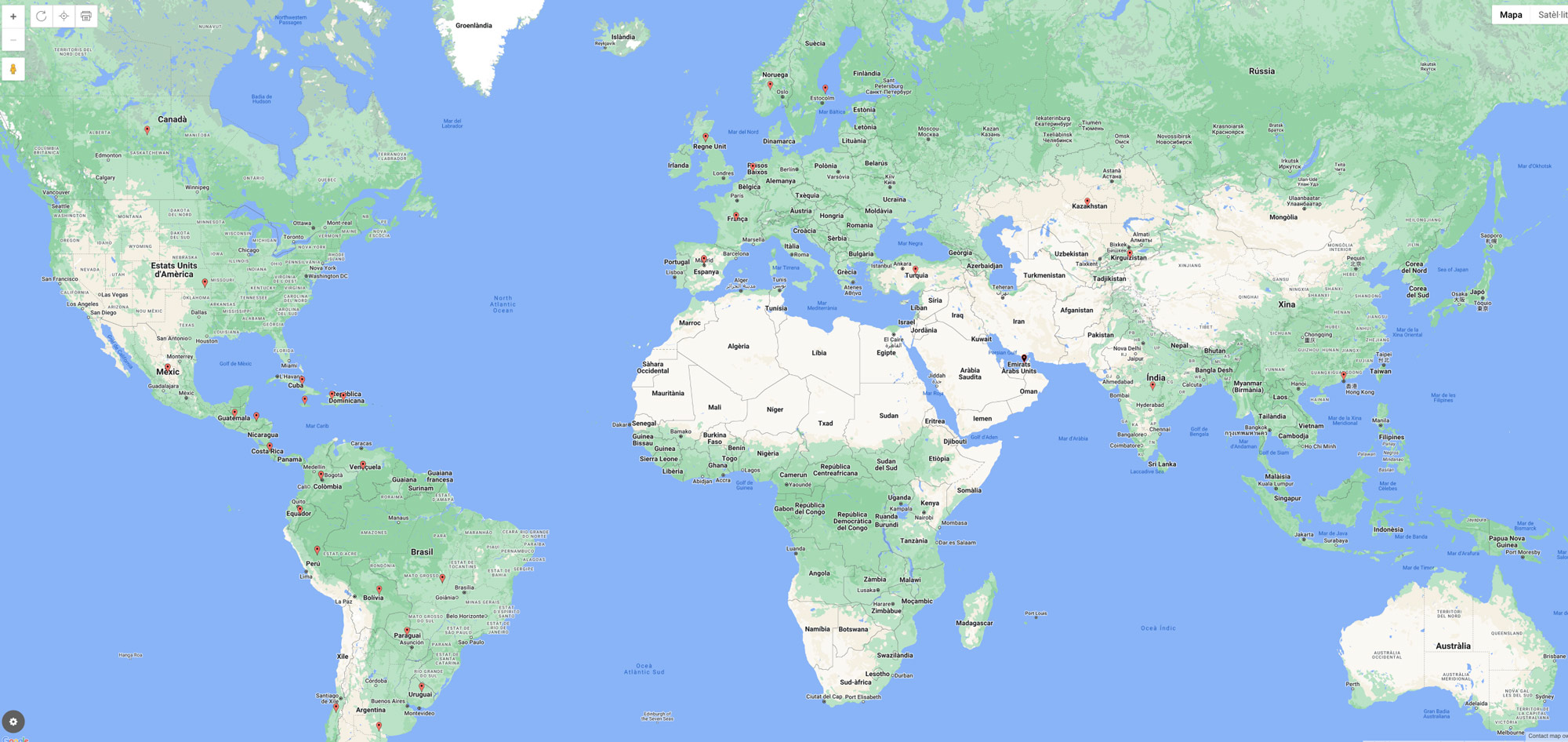
Credits
GOVERNING BOARD
Chairman
Dameon Black
Vice President
Miriam Alpizar Santana
Board Members:
Valentina Canese Caballero
Olda Cano de Arraúz
Eddy Cordova
Paulo Falcón
Dixton Montgomery Findlay
María Altagracia López Ferreiras
Santiago Jaime Ruiz Álvarez
Ramón Ulises Salgado Peña
TEAM
Director
Francesc Pedró
Program and analysis team:
Dana Abdrasheva
Salma Ahmed
Alep Blancas
Eglis Chacon
Mauricio Escribens
Victoria Galán
Daniela Gallegos
Luz Gamarra
Yuma Inzolia
Bosen Liu
Sebastián Mattos
Ana Mendigutxia
Harold Mera
Takudzwa Mutize
Galina Pelikhova
José Antonio Quinteiro Goris
Débora Ramos Torres
Jaime Roser Chinchilla
Emma Sabzalieva
Arianna Valentini
Francisco Zamorano
Administration and services team:
Yara Bastidas
Edward Betancourt
Claudia Delgado
Zulay Gómez Marín
Francisco Antonio Losapio Rojas
Sara Maneiro
Neus Pasamonte
Yeritza Rodríguez Ruiz
